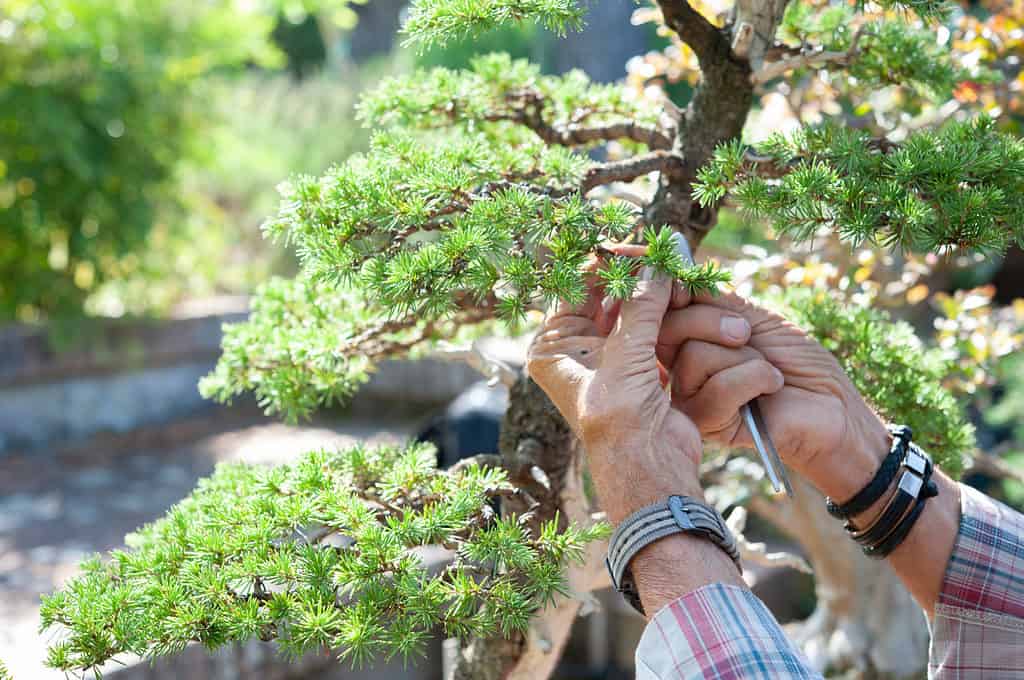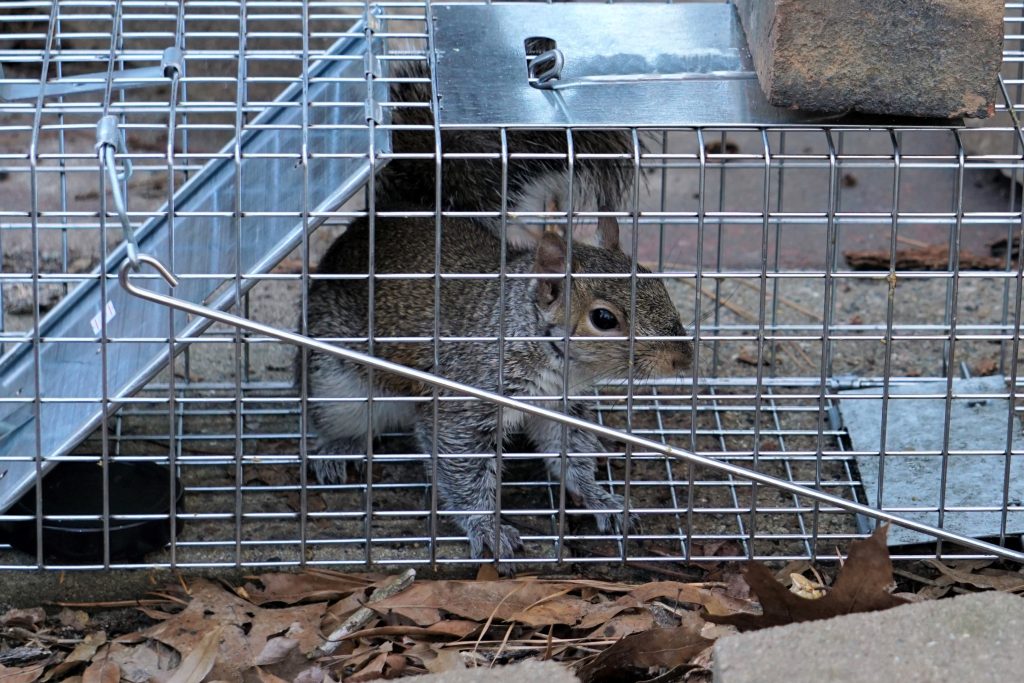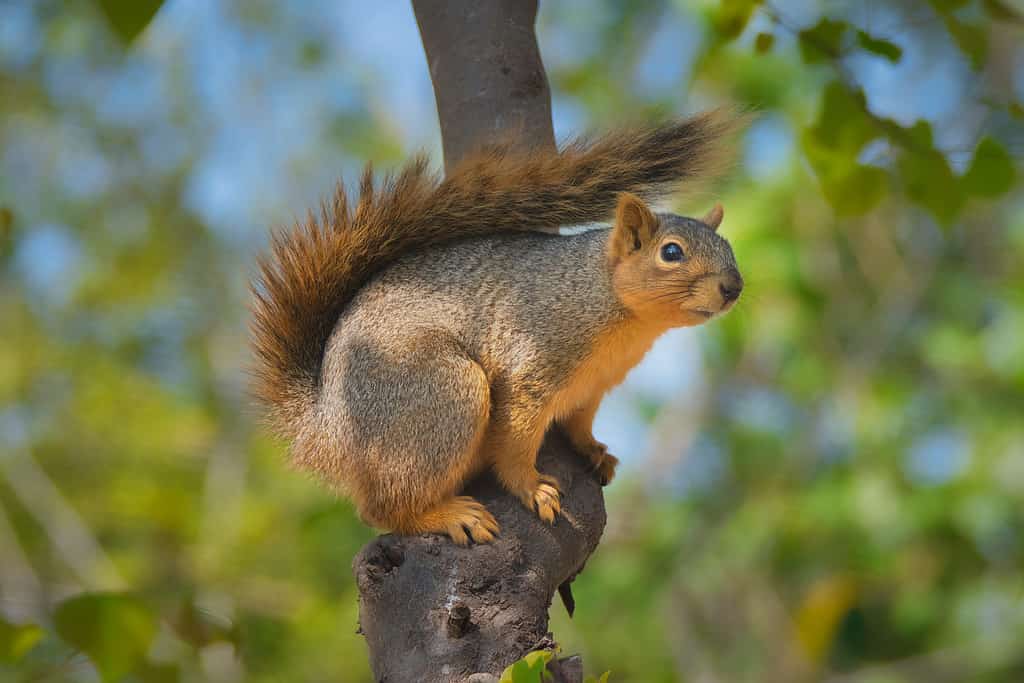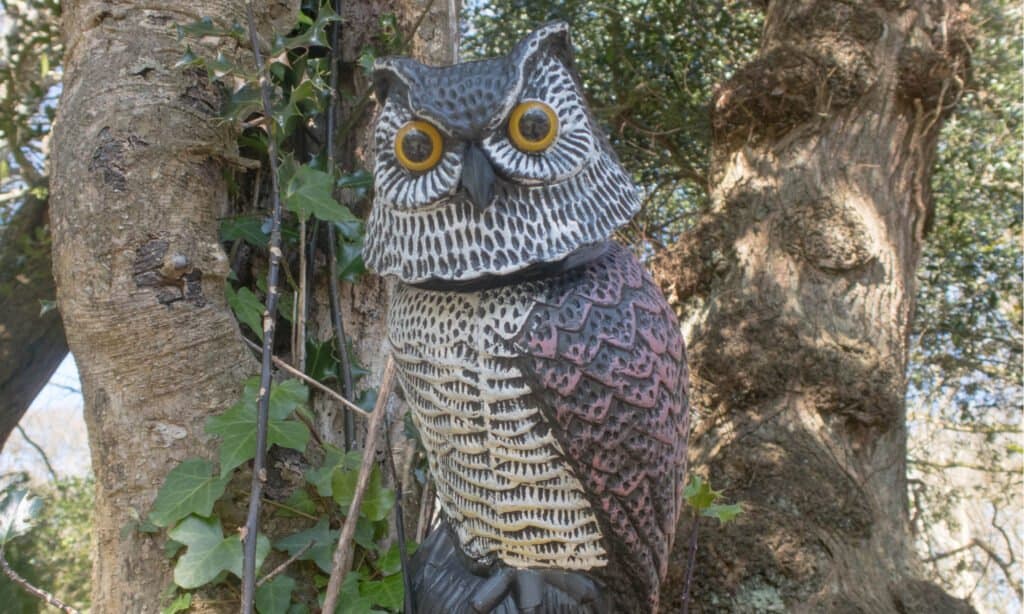5 Natural and Effective Ways to Get Rid of Squirrels
Squirrels can be very fun to watch. However, their antics can also be unwelcome, especially if they start nibbling in your garden. Luckily, there are some natural and effective ways to get rid of squirrels without harming them.
Before resorting to drastic measures, consider these potential solutions.
1. Make Your Yard Less Appealing

Trim trees in your yard regularly to prevent the creation of “squirrel highways.”
©Federico Magonio/Shutterstock.com
Squirrels are hanging out in your yard for a reason. If you can remove that reason, the squirrels may look for greener pastures elsewhere.
Firstly, this includes removing food sources. Bird feeders, fruit trees, and overflowing compost bins should all be modified so they are no longer accessible to the squirrels. You may need to invest in a squirrel-proof bird feeder or remove all the excess fruit from your yard.
Squirrels also love overhanging branches, as they make it easier to get around. Consider running branches to create a barrier and interrupt the squirrels’ “highway.” You don’t have to keep all the branches short but consider trimming those the squirrels use often.
Preferably, the branches shouldn’t allow the squirrels to jump from tree to tree or onto your house.
If the squirrels get inside your attic, you’ll need to seal any entry points into your home. Inspect your roof and exterior walls for cracks and holes the squirrels may use to sneak in. Use caulk or metal mesh to seal these entry points. When in doubt, hiring a professional is a good option!
2. Use Scents Strategically

Squirrels typically do not like spicy substances, including cayenne pepper.
©Thanatip S./Shutterstock.com
Now that you’ve made your yard less appealing, it’s time to add some negatives.
There are tons of scents that squirrels don’t like. If you add these to your yard, it may be enough to keep them out (especially if you eliminated the reason they were coming around to begin with).
Cayenne pepper, garlic, and onion are all-natural deterrents. Place sachets of spices around your yard where the squirrels tend to hang out. You can also place them where you don’t want the squirrels to be, such as around your garden bed.
You can also use commercial repellents, which tend to work a bit longer. If you go this route, select EPA-registered repellents to ensure they’re safe for squirrels and other wildlife. Often, these repellents contain capsaicin from chili peppers or predatory pheromones. Either way, squirrels don’t like them.
While these commercial repellents are bought at a store, they’re often made using natural ingredients. The EPA seal also ensures safety.
3. Trapping and Relocation

Trapping and relocating squirrels is about as natural of a deterrent as you can get.
©Paul Hamilton/iStock via Getty Images
You can also try trapping and relocating the squirrels somewhere else in serious situations. Humane, live traps can capture squirrels without harming them, allowing you to release them far away from your property.
Often, it’s best to have a professional handle this. After all, there are often laws regulating the transport of wildlife.
While this method may seem like the easiest, it’s often expensive and takes time. Plus, if your yard attracted one squirrel, it will probably attract another. We don’t recommend planning on trapping all the squirrels that show up. But this method works well if one particular squirrel invades your attic space.
If you decide to trap the squirrel, ensure the trap is appropriately sized and has adequate ventilation. Checking the traps regularly is also vital. Otherwise, you risk leaving the squirrel inside the trap for too long.
4. Consider Sound Devices

Some squirrels may naturally flee from loud noises, but it often doesn’t take long for them to become used to the interruption.
©Troy Thomas/iStock via Getty Images
Occasionally, sound devices can work to chase squirrels out of your yard. Ultrasonic repellents are the most common. These devices emit high-frequency sounds that humans cannot hear. However, they can be unpleasant for squirrels.
We don’t recommend this as your first method, though. It isn’t as effective as the three methods above, and many other animals can hear these sounds, too – including your pets. Therefore, it isn’t a practical situation for everyone.
Playing loud music is reported by some homeowners to work. If you live in a quiet neighborhood, though, this may not work. There is also the chance that the squirrel will just get used to the music.
All of these sound devices naturally keep squirrels away. It’s just in their nature to avoid loud noises. However, they aren’t as direct as some other methods.
5. Natural Predator Decoys

The effectiveness of predator decoys is often hit-and-miss. Moving the decoy occasionally may increase its effectiveness.
©Peter Turner Photography/Shutterstock.com
Squirrels are naturally afraid of predators. They’re programmed to stay away from anything they think might eat them. Therefore, you can use decoys to make squirrels think there are predators nearby, which may be enough to scare them off.
Plastic owl decoys are the most common option. These decoys are often advertised as scaring away birds, but they often work on squirrels, too. Fake snake models may also work, but it’s important that you use actual decoys and not toys. Toy snakes tend to be made of unsafe materials and break down faster than decoys made to be left outside.
Many people report a lot of hit-and-miss with decoys, though. They don’t work all the time, and squirrels have a tendency to become used to them.
The photo featured at the top of this post is © Dmitry Potashkin/iStock via Getty Images









